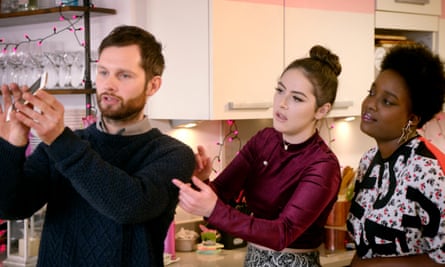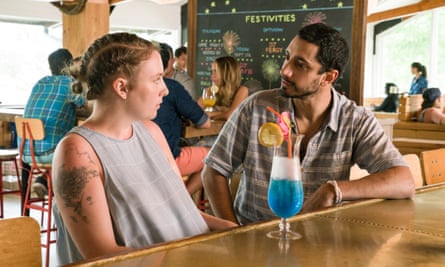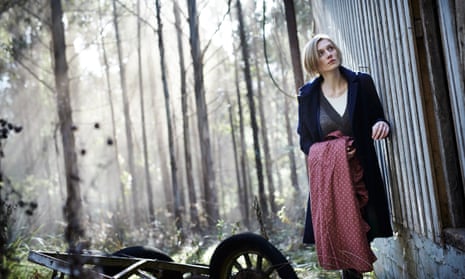The Kettering Incident (Sky Atlantic)
Pls Like (BBC3) | iPlayer
Girls (Sky Atlantic)
The Moorside (BBC1) | iPlayer
I occasionally like to think most of this nation’s problems could have been solved had the 19th century kept all the convicts here, with the rest of law-abiding Britain upping sticks wholesale to Australia. Instead, we gifted our criminals a few acres of beautiful farming headland, perfect weather, beaches and coral and rainforests and sat back smug with our snaggle teeth and righteous, rained-on foot rot. Fast-forward, and we got back, yes, Kylie, Germaine Greer and Clive James, but also those barkeeps whose perpetual birdsong – no worries, mate! – seems expressly designed to ratchet stress, Murdoch, Foster’s and the bloody Wallabies. Was that altogether a good deal? Cui, exactly, bono?
We also have, winging its way back to us now, a subgenre recently dubbed Tasmanian gothic, which differs from our Victorian version in being decidedly unromantic (and hence, phew, not featuring Byron or “misunderstood” vampire werewolves). Instead, it focuses on the mysteries of the aboriginal landscape, and the many sins visited by colonialism and correctionalism in Van Diemen’s Land. And of course I’m being flippant in my first par: anyone who doubts the venal insanities of penal colonialism need only skim a few pages of Robert Hughes’s magisterial The Fatal Shore, and Tasmania in particular has many unconscionable guilts.
To this genre, then, comes a rich new addition in The Kettering Incident, an exceedingly strange yet rather wonderful $14m offering from Sky (though the BBC and Channel 4 both had a hand in its inception), touted, as all such things must be, as the new Twin Peaks. Which must be niggling for the actual Peaks, due to return in May. Anyway, there are spooksome lights in the trees, and inexplicable nosebleeds, and birds that whump deep-frozen from the sky; intriguingly there’s a headland that shouldn’t by any rights actually be there, which vanishes in photographs. It’s all rather beautiful, less coy-whimsical than Twin Peaks, and the Tassie landscape deserves its headline billing. I count myself horribly privileged to have actually been there, and can vouch for that truly odd mix of home counties climate, lowering clouds over the downs, and sudden lurches to the mad botanical architecture of a rainforest in which no colours yet have names, like Trumpton on an acid trip.
The story hasn’t really got going. Or perhaps I just had too many eyes on Elizabeth Debicki, that lovely Jed off The Night Manager. Liz’s Anna, an expat Tassie who’s now a doctor in London, with a dead friend deep in her background, returns to her homeland to try to make sense of many things – not least, inexplicable blackouts. There are snotty locals with unexplored grievances, and a looming war between loggers and greenies, but this is very much an atmospheric slow-burn, not for those with the attention spans of koi. I’ll still go all-out and promise rewards and more, and even if you have to watch more than once, it’s hardly a trial, with those vistas.

It’s not loggers, not even bloggers, but vloggers we have to watch out for in the funniest thing on TV all week, bizarrely squirrelled away on BBC3. For “bizarrely”, read “uselessly”. But Pls Like is a wonderful find. No matter that vloggers, with their kickably infuriating perfect lives and immaculate optimism and terribly healthy sponsorship deals, are overripe for ridicule: the real discovery is Liam Williams. The young comedian, who describes himself winningly as “a 51-year-old grumpy technophobe in the body of a 28-year-old grumpy technophobe”, likes to mock all matters relating to video-logging and its absurdly perky proponents, until he gets the chance to win £10,000 y successfully passing vlogging “challenges” – the beauty tips, the fitness, the “pranks” – oh God, the pranks. Cue much ill-willed raising of Liam’s eyebrow as he must undergo mentoring in the art of solipsistic indulgence by soft minds with hard bodies and too many followers. My favourite exchange, in the “health and beauty “ episode:
Peppy vlogger Millipede and bestie Chloe: “Can you take a selfie of us?”
(Liam tries awkwardly to get into shot)
“No, can you? Take a selfie? Of us?”
Liam, after tired pause: “You mean… a photo.”
But in truth, every passage fizzes with real wit. Over the series minds are changed, and not just those of the characters. It’s subtle, bright and hilarious, which makes it all the more astonishing it’s being hidden, although This Country, their mockumentary anthem to doomed Cotswold youth also showcases the digital channel’s new gift for brilliance.
As her last ever series of Girls kicks off, Lena Dunham’s character Hannah Horvath sums up. “My personality’s very witty and, like, narcissistic. I give zero fucks about… anything, yet I have a strong opinion on, you know, everything, even topics I’m not informed on.” That’s not just Hannah talking; it’s Dunham all over, and she splits nations: spoiled, paranoid hipster with ridiculously first-world problems, or an Everygirl for our troubled times?

I land – just – on the sympathetic side, because of some bravura writing, and similar performances. Chelsea Peretti is good in anything, it’s gratifying to see Riz Ahmed survived The Night Of, and I can’t remember the last time, if ever, a woman (Dunham) with a nonperfect body was quite so relentlessly naked for so much of a primetime show, neither seeking nor giving quarter to the unforgiving camera. By turns celebratory and suicidal, rich with both banalities and emotional paint stripper, this will surely, to the end, succeed in dividing schools, families, feminists, nations as to whether it’s sublime observed humour or as funny as rectal polyps. Even in a nation – possibly especially in a nation, and that’s the point – which might be thought to have larger, certainly more bloviating, individuals to worry about.
The Moorside flagged not one whit in its closing chapter, as World’s Best Mum Karen Matthews sought refuge from a hitherto “loving” community, now out to murder her, in the seat of the despised police car. The performances of Gemma Whelan, Sheridan Smith and Sian Brooke have rightly been lauded, and helped make this, a little surprisingly, the BBC’s most watched new drama for 15 years (and that includes Sherlock). I’d like to think this is because the writing, the dramatic flair, gripped with white knuckles, but is that because I’m a little queasy at the alternative, which is a nation around me indulging in a cheap and easy and extended two-minutes of hate?
But there was also a quieter and constant presence throughout in Siobhan Finneran, wholly and urgently credible as liaison officer DC Christine Freeman. Christine and her colleagues must have been on eggshells every long minute of this story, trying to simply copper while treading with thistledown slippers between community distrust, class envy, mob vengeance, tabloid frenzy, political diktat… it must take some grist and mettle to be a female Yorkshire officer these fraught days, as acknowledged by Sally Wainwright in Happy Valley. Still, compared to real life, Catherine Cawood can’t know the half of it.

Comments (…)
Sign in or create your Guardian account to join the discussion